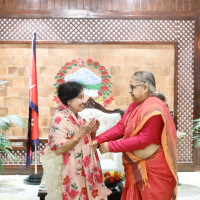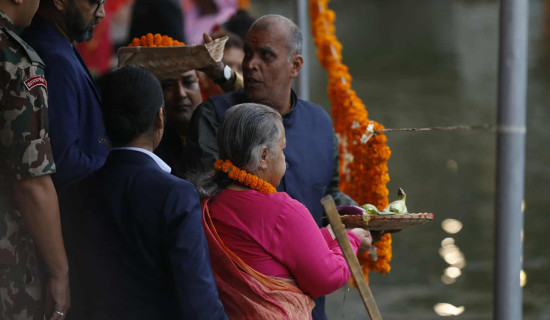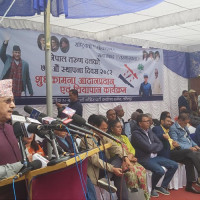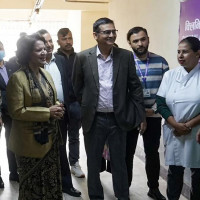- Tuesday, 28 October 2025
Recognise Feminine Power Beyond Scriptures
Dashain is the most cherished festival for all Hindus across Nepal and beyond. It is the time of family reunion, feast and religious fervour. Once deserted villages become vibrant, families come together and people reunite. At its core, Dashain is the celebration of feminine energy, Shakti. We worship Goddess Durga and her nine manifestations during Dashain. The nine manifestations of goddess Durga or Navadurga are: Shailaputri, Brahmacharini, Chandraghanta, Kushmanda, Skandamata, Katyayini, Kalaratri, Mahagauri, and Siddhidhatri, all fierce and powerful. Navaratri in Dashain symbolises the worship of the divine feminine within oneself and seeking strength to overcome weaknesses.
At the allegorical level, Dashain celebrates the triumph of good over evil. Goddess Durga slaying the monster Mahishasur symbolises a woman's strength, protection, and liberation. Brahma had granted Mahisahasur the boon of immortality. He, after receiving the boon from Brahma, becomes so powerful that he starts threatening the divine forces. His demise led to the restoration of cosmic order and symbolises the conquest of malevolent forces. This shows that the sacred feminine is the ultimate power source.
Energy
An article 'Mahishasurmardini: A celebration of feminine power' by Meena Banerjee, published in The Hindu, says, "Chandi or Devi-Mahatnyam establishes that Durga resides in every living being as energy (Shakti), illusion (Maya), motherly instincts (Matri), compassion (Kshama) and peace (Shanti), among many other valued virtues respected by mankind in general." It says Goddess Durga is not just a cosmic warrior who defeats demons; she exists within every living being.
Banerjee further adds, "Maishasur, half man, half god, indicates the animalistic nature of man, the slaying of Maishasur often depicts that when feminine power comes into play, beastliness gets crushed." It reinforces the belief that true power is overcoming inner and outer evils. The way we revere goddess Durga in temples, we should be able to revere goddess Durga, the feminine energy, in every household.
When every household prepares for this religious extravagance, irony unfolds within every home. When we are busy worshipping the divine feminine in temples, we forget that the humane feminine is confined in the kitchen, overwhelmed with household chores, cooking, cleaning, preparing for pooja, taking care of children, the elderly and guests. During nine days of Dashain, we worship nine forms of feminine power. Every house reverberates with the chants of mantras and the fragrance of incense that purifies the houses, calms the mind and brings positive energy.
The red tika and jamara at the symbolic level manifest the belief that feminine energy, Shakti, brings peace and prosperity in the house. Yet this glorification of the feminine power diminishes when our gaze shifts from the worship room to the kitchen. It feels as if we glorify feminine energy in mere scriptures and religious hymns, but the glorification and reverence for the same feminine energy lack in the domestic sphere.
Women's domestic work increases manifold during festivals, whether Dashain, Tihar, or any other festival. Both homemakers and working women find it daunting to accomplish the increased domestic work during festivals. Days of preparation for Dashain, unending cooking, doing dishes, cleaning the house, looking after children and older people, and attending to the guests drain women physically and mentally and alienate them from the festival, claiming to celebrate feminine energy. With so much work, women hardly find time to socialise, enjoy the festival, or take care of themselves. At the time when we are glorifying Durga in the temple, we fail to revere Durgas in our household.
Srinath Sridharan, in his article Celebrating women but still binding them to societal expectations' in Deccan Herald, writes, "This contradiction is glaring in our society's simultaneous celebration of goddesses during festivals – symbols of strength, resilience, and power – while the harsh reality of women's treatment in our homes, workplaces, and streets remains unchanged."
We idealise the strength, resilience and power of a goddess, but the everyday discrimination and violence women face are ignored. It depicts our hypocrisy of how we idealise symbolic respect over real-world change.
Women meticulously clean and decorate worship rooms; the 24/7 burning incense and oil lamps, fruits, and sweets do not leave time for the women even to pause and reflect on whether they receive reverence and regard in the household for what they do to make this festival a festival in an absolute sense. Have we ever paused to reflect on whether a daughter-in-law gets the respect for what she truly does to make this festivity functional?
We hardly do; for ages, we have taken the domestic labour of women for granted. Let's take a moment to reflect on this Dashain. Women have often internalised domestic work that multiplies manifold during Dashain as a duty and responsibility. Exhaustion from multitasking is neither acknowledged nor relieved; instead, it is dismissed as a mere duty.
Patriarchal dynamics
Patriarchal dynamics romanticise sacrifices, especially sacrifices from the women's side. The irony lies in the fact that we idealise the goddess because she fought against evil, injustice, and sins, but in this mortal world, we idealise women for endurance, and
when she fights for injustice perpetrated upon her, she is no longer idealised; instead, she is ostracised. So the feminine divinity we romanticise and apply in real-life situations is very different.
If we genuinely want to honour feminine energy, let the divine feminine be worshipped in temples and in every home in the form of honouring and revering our mothers, sisters, aunts, daughters, and daughters-in-law. Let's give them time to enjoy the festival, socialise and pause from the daily grind.
(Adhikari is a journalist at this daily.)
















